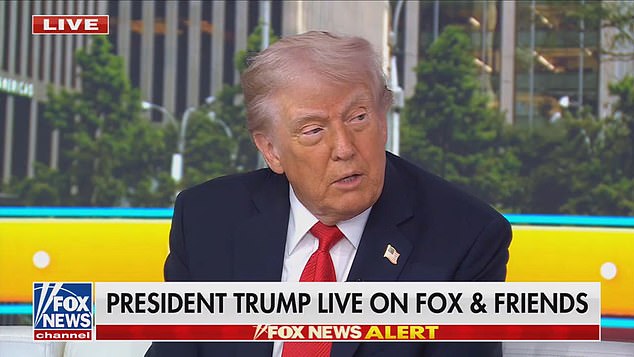“Words matter,” declared Pete Hegseth, as President Donald Trump formally rebranded him as America’s secretary of war last week – a move widely interpreted as a sign that the president might be shelving his campaign to win a Nobel Peace Prize in favor of winning wars instead.
Yet the cumulative message from the Oval Office ceremony – and from Mr. Trump’s words and actions since returning to the White House – seem quite different.
The evidence suggests what might be called a Trump litmus test.
Why We Wrote This
Pete Hegseth is now the “secretary of war,” not “of defense,” but what does his boss, President Donald Trump, mean by “war”? He has shown a distaste for conflicts that take more than a few days to resolve.
The president is ready to project strength where he sees the prospect of quick military, diplomatic, or political victories. But he tries to avoid or disengage from conflicts that risk messy entanglement or the appearance of weakness.
Though that has spelled trouble for less powerful adversaries, it has shown little sign so far of unsettling the most powerful players in the world’s two main areas of conflict: Russian President Vladimir Putin in Ukraine, and Israeli Prime Minister Benjamin Netanyahu in Gaza.
And it has raised a potentially critical question about America’s chief rival: China.
How will this litmus-test approach affect President Xi Jinping’s calculations about U.S. pushback, should he make good on his vow to “reintegrate” the island democracy of Taiwan into the Chinese mainland?
The “quick win” aspect of the litmus test explains Mr. Trump’s targets of choice for U.S. military action so far.
The most recent is the U.S. Navy attack on a speedboat allegedly operated by a Venezuelan drug cartel in the Caribbean.
But he has also dispatched the National Guard to Democratic-run cities including Los Angeles and Washington. And he ordered a bunker-busting attack on Iran’s nuclear facilities in June only after waves of Israeli strikes had disabled Iranian air defenses.
Mr. Trump’s aversion to messy entanglements, however, has led to a very different picture in Ukraine and Gaza.
The president returned to office hoping for quick diplomatic wins and Nobel-worthy peace deals in both places.
Yet, as those prospects have unraveled, his engagement has become increasingly episodic, conducted largely through social media posts and remarks to White House reporters.
He has still shown a periodic readiness to dive back in when he senses a deal might be within reach, an impulse that prompted last month’s Alaska summit with Mr. Putin and occasional pushes for a hostage-release deal in Gaza.
But, in both conflicts, he has made clear his intention to avoid major, sustained involvement until there is a peace deal to wrap up. He has said explicitly, on several occasions, that the only realistic alternative appeared to be to let the warring parties fight things out.
Events on the ground could yet force a change of heart: even greater violence, deeper humanitarian crisis, or more hostage deaths in Gaza, perhaps; or repercussions from this week’s unprecedented incursion of Russian drones into Polish airspace.
Yet, there have been few signs that Mr. Trump is minded to engage in the kind of sustained effort that would be required to resolve either conflict – unless and until there is a clear deal on the horizon.
The defining challenge for his litmus test might prove to be China. No foreign figure looms larger in Mr. Trump’s worldview than President Xi.
The rebranding ceremony for the Department of Defense, at which the U.S. president trumpeted America’s unequaled military might, came only two days after Mr. Xi had presided over an enormous parade of troops and weaponry in Beijing’s Tiananmen Square.
Mr. Hegseth himself has advocated greater U.S. and allied military preparedness in the Asia-Pacific region, in response to Mr. Xi’s vow to absorb Taiwan by force of arms if necessary.
Yet his and Mr. Trump’s characterization of the revival of America’s Department of War – which was subsumed into the new Department of Defense after World War II – gave no clear signal of how they would react if China made such a move.
The president has portrayed the rebranding as a return to an era when America “won wars.”
Mr. Hegseth spoke at the ceremony of “restoring the warrior ethos, restoring victory … as an instinct” and fighting “to win.”
But he also echoed Mr. Trump’s frequent emphasis on avoiding “endless conflicts,” and said it was essential to restore “intentionality to the use of force.”
The balance he struck sounded very much like the two elements of Mr. Trump’s litmus test.
The president will doubtless be hoping that he is proved right in his repeated insistence that the Chinese leader simply won’t attempt a takeover of Taiwan so long as he is in the White House.
But if President Xi does make a move, whether by mounting a full-scale attack or using his military to blockade the island, the key question will be where such actions fall on the litmus scale.
Will they be viewed as demanding a reassertion of America’s military might, a rediscovered “warrior ethos” and a will to “win?”
Or, will the need for “intentionality” before unleashing U.S. force, and the prospect of “endless conflict” and a messy entanglement, stay Mr. Trump’s hand?













